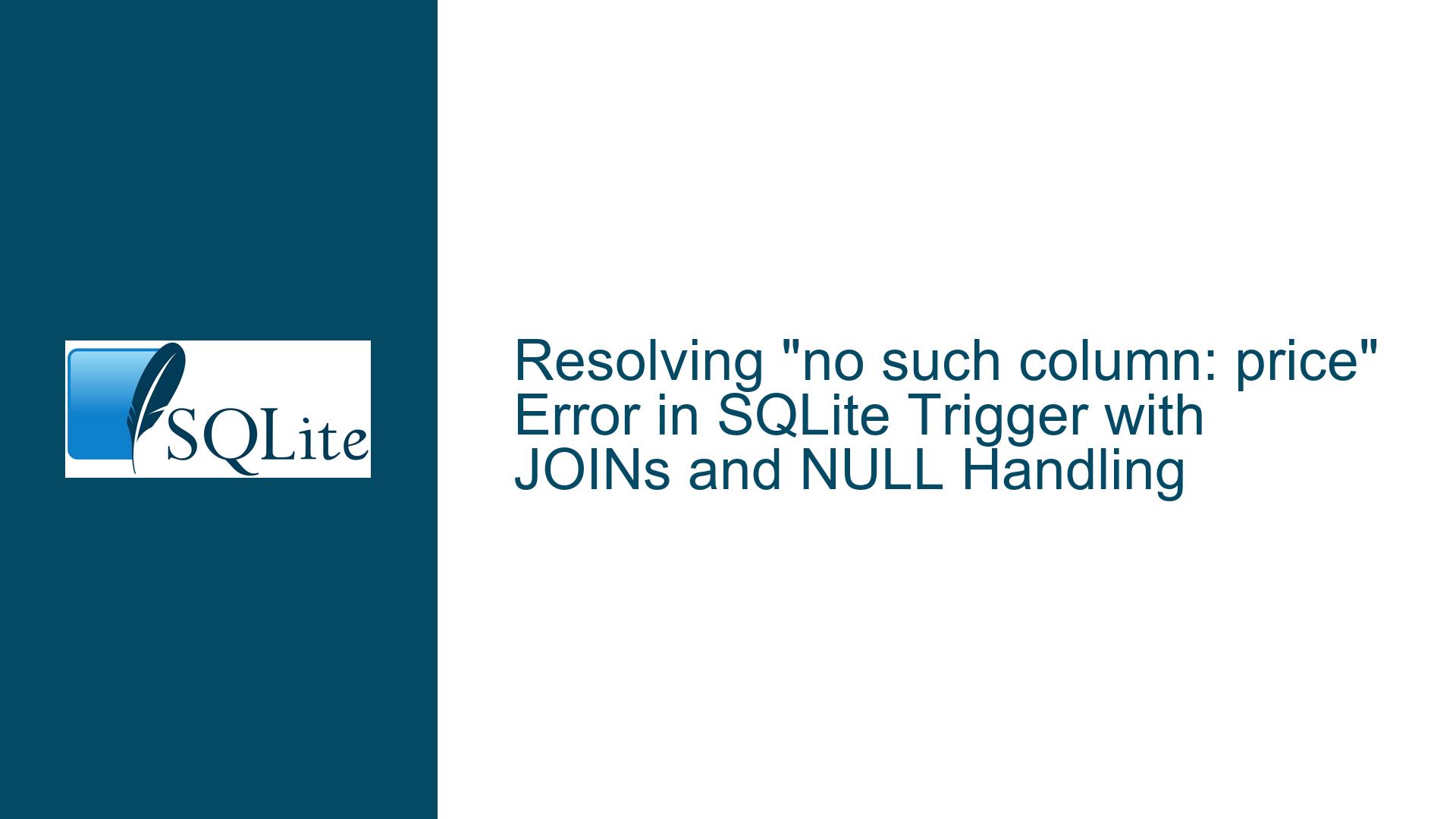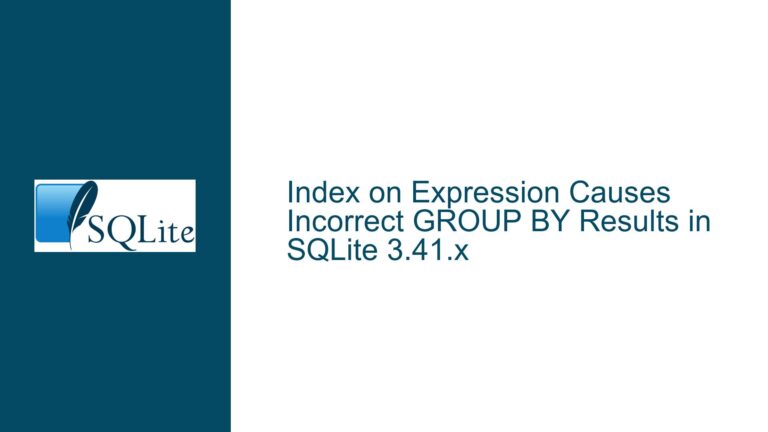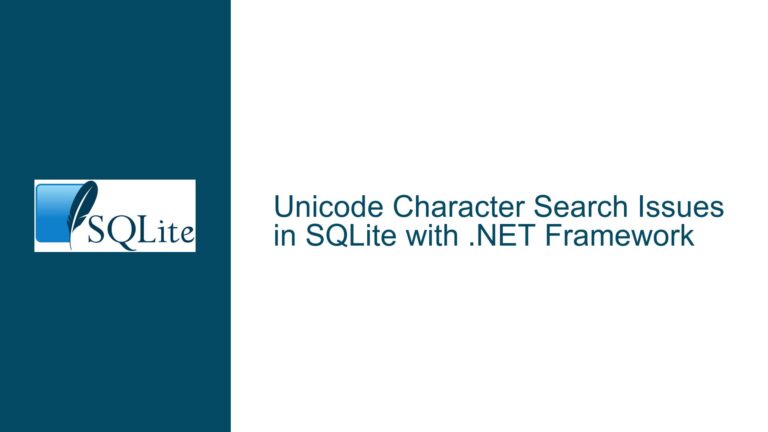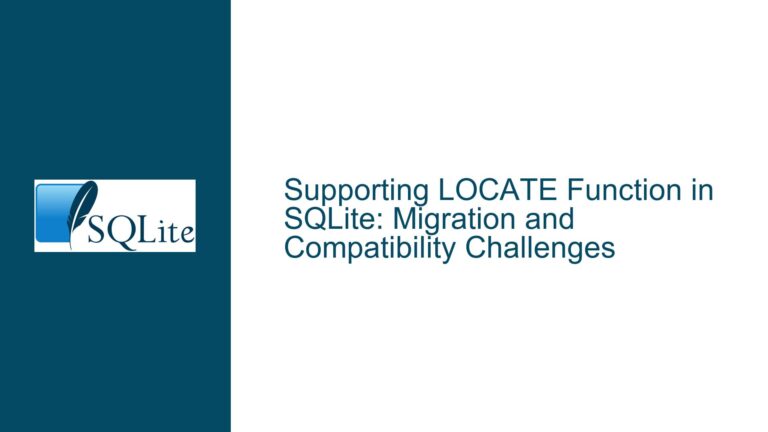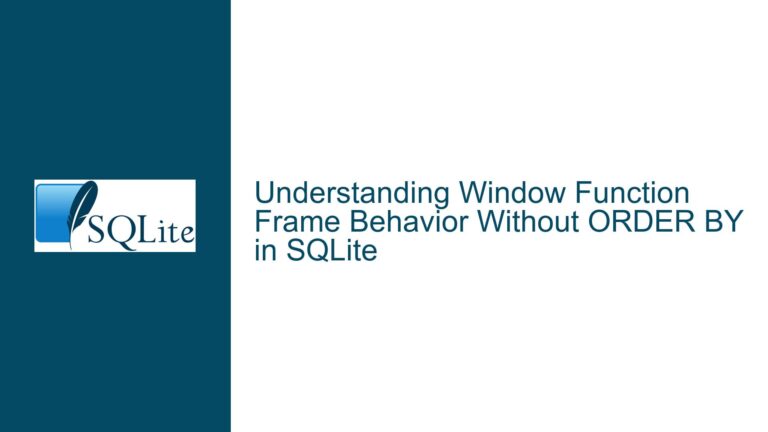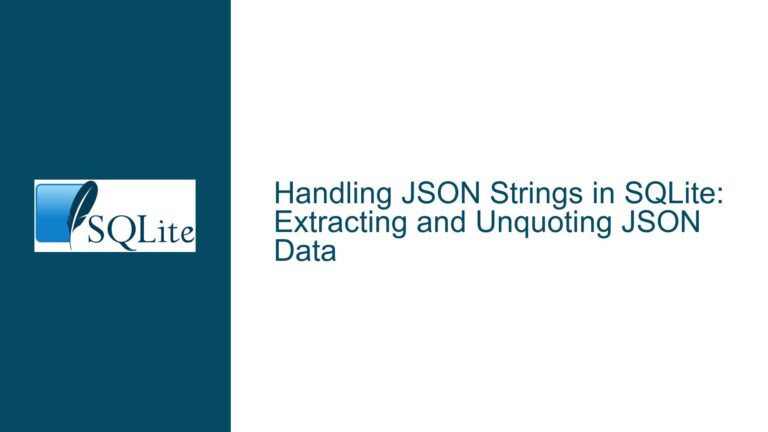Resolving “no such column: price” Error in SQLite Trigger with JOINs and NULL Handling
Issue Overview: Trigger Fails Due to Missing Column, NULL Comparisons, and Scope Mismanagement
The core issue revolves around an SQLite trigger designed to automatically calculate and update the rental_cost field in the Rental table when specific conditions are met during an UPDATE or INSERT operation. The original implementation generated an error (no such column: price) and subsequent revisions introduced new problems, including the trigger failing to fire or updating incorrect rows. Below, we dissect the structural flaws, logical missteps, and SQLite-specific nuances that contributed to these issues.
Misaligned Table Joins and Column References
The price column is not part of the Rental table but is instead located in the Title or License table (exact schema details are inferred from the JOIN logic). The initial trigger attempted to reference price directly from the Rental table, which does not contain this column. This misalignment caused the no such column: price error.
The JOIN logic in the subquery was flawed because it did not explicitly filter results to the row being updated. Without a WHERE clause tying the JOINed tables to the NEW or OLD virtual tables (representing the row before/after the update), the subquery could return multiple rows or no rows at all, leading to unpredictable behavior.
Improper NULL Value Handling
The original WHEN clause used = NULL and != NULL, which are invalid in SQL. Comparisons with NULL require IS NULL or IS NOT NULL because NULL represents an unknown value and cannot be equated using standard operators. This mistake prevented the trigger’s WHEN condition from evaluating correctly, causing the trigger to not fire when intended.
Additionally, the UPDATE statement inside the trigger used WHERE rental_cost = NULL, which is syntactically incorrect and would never match any rows. This further prevented the trigger from updating the rental_cost field as intended.
Trigger Scope and Row Identification
The UPDATE command within the trigger lacked a filter to restrict changes to the specific row being updated. Using WHERE rental_cost IS NULL would update all rows with a NULL rental_cost, not just the one affected by the triggering UPDATE statement. This oversight risked corrupting data in unrelated rows.
The subquery responsible for fetching the price value did not correlate with the current row being processed by the trigger. Without explicitly linking the JOINed tables to the NEW virtual table (e.g., via NEW.license_id), the subquery might retrieve a price from an unrelated row or fail entirely if multiple matches existed.
Possible Causes: Column Mappings, NULL Logic, and Subquery Isolation
Cause 1: Incorrect Column Scope in JOIN Operations
The price column exists in either the License or Title table but was erroneously referenced as if it belonged to Rental. SQLite validates column names during trigger creation, and since price was not present in Rental, the parser rejected the query.
The JOIN logic in the subquery did not include a condition to ensure that only the relevant license_id or title from the updated row was used. For example:
SELECT price
FROM License
JOIN Title USING (title)
WHERE License.license_id = NEW.license_id;
Without this correlation, the subquery might return no rows (if no matching license_id/title existed) or multiple rows (causing a runtime error if used in a scalar context).
Cause 2: Improper NULL Comparison Syntax
Using = NULL or != NULL in SQL is always invalid because NULL is not a value but a placeholder for missing data. The correct syntax uses IS NULL or IS NOT NULL. For example:
WHEN OLD.rental_cost IS NULL AND NEW.date_back IS NOT NULL
Failing to use these operators caused the trigger’s WHEN clause to evaluate to NULL (equivalent to false in a boolean context), preventing the trigger body from executing.
Cause 3: Uncorrelated Subquery and Unrestricted UPDATE
The subquery inside the SET clause of the trigger’s UPDATE statement did not correlate with the row being updated. This meant the subquery would execute independently of the current row’s context, potentially returning incorrect or multiple values.
The UPDATE statement’s WHERE clause (rental_cost = NULL) was syntactically incorrect and functionally useless. Even after correcting it to IS NULL, the absence of a row-specific filter (e.g., WHERE rowid = NEW.rowid) meant the trigger would update all rows with a NULL rental_cost, not just the one being processed.
Cause 4: Date Arithmetic on TEXT Columns
The date_out and date_back columns were stored as TEXT in ISO 8601 format (YYYY-MM-DD HH:MM:SS). Direct subtraction of these values (e.g., date_out - date_back) would not yield the number of days between dates because SQLite treats TEXT fields as strings, not dates. Without converting these values to Julian days or Unix timestamps, the arithmetic would produce incorrect results or errors.
Troubleshooting Steps, Solutions & Fixes
Step 1: Correct Column References and Subquery Correlation
Problem: The price column is not in the Rental table.
Solution: Rewrite the subquery to fetch price from the correct table and correlate it with the updated row.
Example Fix:
CREATE TRIGGER updater
AFTER UPDATE ON Rental
FOR EACH ROW
WHEN OLD.rental_cost IS NULL AND NEW.date_back IS NOT NULL
BEGIN
UPDATE Rental
SET rental_cost = 3 + (
SELECT price
FROM License
JOIN Title USING (title)
WHERE License.license_id = NEW.license_id
) * 0.05 * (julianday(NEW.date_back) - julianday(NEW.date_out))
WHERE rowid = NEW.rowid;
END;
Key Adjustments:
- Removed unnecessary JOIN with
Rentalin the subquery. - Correlated the subquery with
NEW.license_idto ensure it fetches thepriceassociated with the current row. - Used
julianday()to convertTEXTdates to numeric values for accurate day count calculations. - Restricted the
UPDATEto the current row usingWHERE rowid = NEW.rowid.
Step 2: Use Proper NULL Handling in Conditions
Problem: = NULL and != NULL comparisons are invalid.
Solution: Replace all instances with IS NULL or IS NOT NULL.
Example Fix:
WHEN OLD.rental_cost IS NULL AND NEW.date_back IS NOT NULL
Validation:
- Test the trigger with
INSERT/UPDATEstatements that setdate_backto non-NULL values and verify thatrental_costis populated.
Step 3: Isolate Trigger Effects to the Current Row
Problem: The UPDATE affects all rows with rental_cost IS NULL.
Solution: Use NEW.rowid to restrict updates to the row being processed.
Example Fix:
WHERE rowid = NEW.rowid;
Validation:
- After updating the trigger, perform an
UPDATEon a single row and confirm that only that row’srental_costis modified.
Step 4: Handle Date Calculations Correctly
Problem: Subtracting TEXT dates does not compute days between dates.
Solution: Use julianday() to convert dates to Julian day numbers before arithmetic.
Example Fix:
(julianday(NEW.date_back) - julianday(NEW.date_out))
Validation:
- Test with known date ranges (e.g., 2023-01-02 – 2023-01-01 = 1 day) to ensure the calculation is accurate.
Step 5: Verify Schema and IDE Caching Issues
Problem: The trigger worked after recreating tables manually, suggesting schema caching issues in SQLiteStudio.
Solution: Explicitly refresh the database schema or restart SQLiteStudio after making schema changes.
Validation:
- After modifying triggers or tables, run
PRAGMA schema_version;to increment the schema version and force a refresh.
Final Optimized Trigger Code
CREATE TRIGGER updater
AFTER UPDATE ON Rental
FOR EACH ROW
WHEN OLD.rental_cost IS NULL AND NEW.date_back IS NOT NULL
BEGIN
UPDATE Rental
SET rental_cost = 3 + (
SELECT price
FROM License
JOIN Title USING (title)
WHERE License.license_id = NEW.license_id
) * 0.05 * (julianday(NEW.date_back) - julianday(NEW.date_out))
WHERE rowid = NEW.rowid;
END;
Testing Script:
-- Test case: Update date_back for a specific rental
UPDATE Rental
SET date_back = '2023-10-15 14:30:00'
WHERE gamer_id = '12' AND license_id = '71811';
-- Verify rental_cost is calculated
SELECT rental_cost
FROM Rental
WHERE gamer_id = '12' AND license_id = '71811';
By addressing these areas systematically—column references, NULL handling, row isolation, date arithmetic, and schema management—the trigger will function as intended, accurately computing rental_cost while avoiding unintended side effects.
